Civilization 5: Brave New World review time! The latest and most likely final expansion to Civ 5 is out tomorrow (July 9) for North America, and July 12 worldwide for both PC and Mac. I've been playing the expansion for a few days now, and I am very, very happy to report that Brave New World is fantastic. The new trade system and Culture Victory transform and revitalize the builder game. The World Congress and the Ideology system make the late game much more exciting. The new Civs are great. And Archaeology adds something truly new to the Civ series. I would be doing Brave New World a disservice to call it Civ V's best expansion pack. It's more than that: it's the best thing that's ever happened to Civilization V. UPDATE: check out our review roundup and see what everyone else is saying (they all like it too).
Before we dive into the Civilization 5: Brave New World review proper, let me say this: I didn't love vanilla Civ 5. It had some great new mechanics, but lost a lot of the depth of Civ 4 (full disclosure: Civilization IV is my favorite game of the 2000s), and the builder game - my personal playstyle - was heavily broken. Gods and Kings, the first expansion, added a Religion system that was much more robust and interesting than Civ 4's. It was a solid expansion, and it made Civ 5 much better.
Brave New World does the same thing, with a focus on the late game and the builder's game. It goes much farther, and I believe it takes Civ 5 to its apex. Alright, let's dive in.
Civilization V: Brave New World Review: Civilizations
What better place to start a Civilization V: Brave New World review than with the new civilizations? There are nine new civs, which you can read about in detail here. I was pretty indifferent about getting new civs at first. That's less interesting to me than new mechanics. Turns out Brave New World integrates the new civs directly with new mechanics. As a result, some of the new civs are truly interesting, demanding very different playstyles than usual.
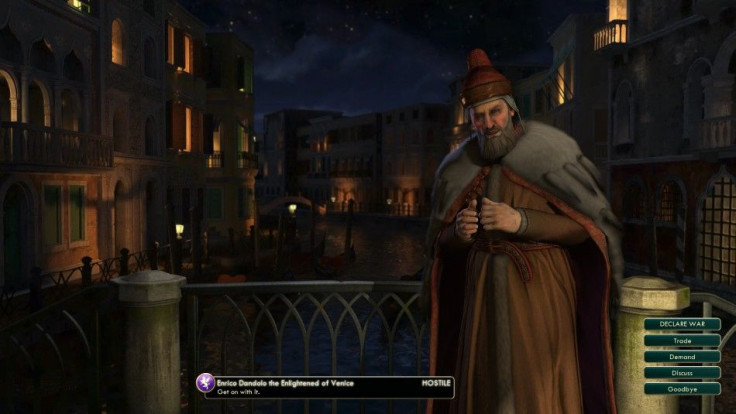
You'll read about the big one in every Civ V: Brave New World review, I'm sure. That's Venice. Their Unique Ability is not being able to build settlers or annex cities. That's right: Venice is One City Challenge deluxe, the ultimate test for a Civ fanatic. They have a unique playstyle and several new mechanics (double trade routes, a unique Great Merchant that can puppet city states, the ability to buy units in puppeted cities), and they'll need it. Firaxis has said Venice is their favorite addition, and it's easy to see why: I've never seen a Civ play this differently from the others. It's weird, but experimentation is great.
The other new civs are interesting, but less dramatic than Venice. They can build settlers, after all. One Shoshone Unique Unit is a Scout that can pick any result from a goodie hut. And their cities start with tons of territory. It's great. Indonesia gets bonus luxuries for expanding overseas. Portugal can claim resources in territory belonging to city states. Assyria, the most ancient civ, throws back to ancient Civ games: when they take cities, they steal a tech. The others (Poland, Brasil, Zulu, Morocco) are less exciting, but nice additions. Overall, the new civs are very solid, much more of an attraction than I expected.
Civilization V: Brave New World Review: Trade
I wasn't very excited about the new trade route system in Brave New World. I was wrong.
The new trade system begins very early, with the discovery of Animal Husbandry, a tech that allows civs to build the Caravan. It also grants a single trade route. Caravans and Cargo Ships are both semi-automated units. Once you build them, you choose a city for them to trade with, either foreign, domestic, or city-state. Foreign routes and city state routes grant both the initiator and the target a certain amount of gold per turn. Science and religious pressure can also flow along the route.
The key is, the amount of gold per turn you get from trade routes is dependent on, among other things, how large and developed the foreign city is. A caravan to a foreign capital can easily bring in 10 to 12 gpt. A cargo ship will bring twice that. And, as you go further down the tech tree, you unlock more trade routes, allowing for more caravans. Many wonders grant an additional trade route as well, allowing players to really specialize in trade if they so desire.
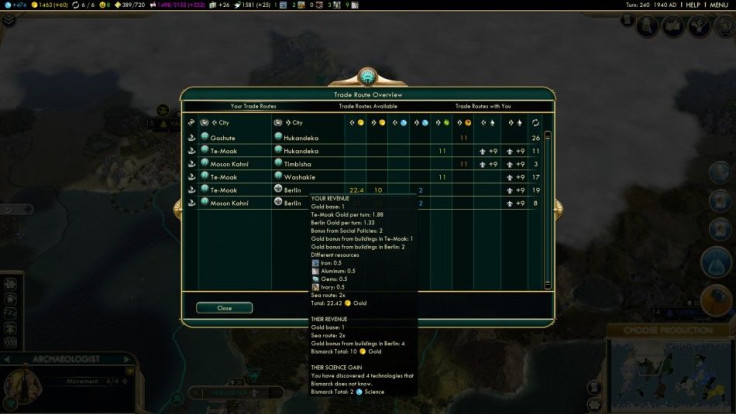
The net effect of trade routes is to make highly developed empires much more viable. Since all buildings cost maintenance but cities themselves do not, in the past, small empires with a few large cities were unsustainably expensive. Large empires with a few large cities and many small cities did alright, until they ran into happiness problems.
Vanilla Civ 5 held players back from building large, focused, builder empires. Brave New World's trade system brings in tons of extra money, and it rewards larger cities. Trade routes to domestic cities can dramatically speed up their growth or production, at the cost of foreign gold, and so they make late game city construction or marginal cities much more workable, similar to the effect of corporations on Civ IV.
And, since trade routes are mostly automated, there is very little micromanaging of caravans. Just set the destination and, if it's going through wartorn territory or the wilderness, protect it. That's it. And, as easily as that, with an engaging economic tweak, building a peaceful, sprawling empire becomes a joy instead of a struggle against the game.
Civilization V: Brave New World Review: Culture and Tourism
The new Culture Victory system in Beyond the Sword had two express purposes: make the end game more interesting, and allow players pursuing a Culture Victory to do more than just turtle. Before, a Culture Victory involved building as few cities as possible so you could more easily fill out five Social Policy trees. It made for a late game where you didn't have much to do: you'd build new cultural buildings as you got them, but otherwise, you'd twiddle your thumbs. It was quite unsatisfying.
That's all done. In the new Culture Victory, instead of building Utopia, a civ aims to make itself Influential over every other civilization. It does so through Tourism, or "offensive Culture." Regular Culture still earns Social Policies and expands your borders; it also protects against foreign civs becoming Influential over you using their own Tourism. But Culture Victory requires generating enough Tourism to completely outpace the Cultural output of each other civ.
And, at least from what I can tell so far, that is quite hard. Generating Tourism up to the early industrial age is slow. Tourism is largely generated from Great Works, which are created by Great Writers, Great Musicians, and Great Artists (which consumes them). These are tough to generate before unlocking their specific National Wonders in the Medieval and Renaissance Eras. Even once you do get them, using them gets tough - Great Works require a place to be displayed, and only a few buildings early on have a slot for a Great Work.
None of these things are problems. In fact, the mechanic of needing to store Great Works somewhere is fairly elegant; Tourism starts out slow, and then slowly scales up. The discovery of Museums and Opera Houses and, later on, Airports and Hotels, dramatically increases the rate of Tourism growth. And many other factors influence your Tourism compared to your opponents. If you share a religion, for instance, you get a 25% Tourism boost against them.
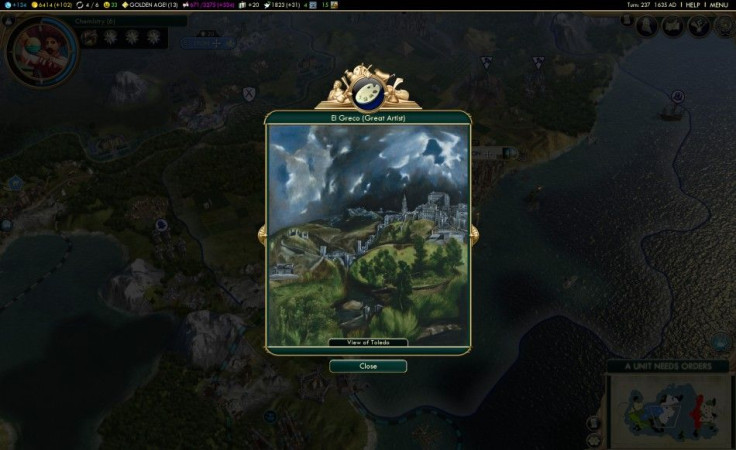
Tourism is a complicated system, and I'll admit that I don't fully have the hang of it yet. There are lots of special bonuses. For example, some buildings have slots for two or more Great Works. Two Great Works with similar themes or origins provide a bonus to Tourism, but it's unclear how to figure out what counts as a similar theme without just swapping things around a bit. That being said, this is a more complex and much more active Culture Victory than the old one, and that's a good thing.
Also, the unique pop ups for each Great Work - an image for artwork, an excerpt for novels and symphonies - is a very nice touch, wonder movies writ on a smaller scale.
Civilization V: Brave New World Review: Archaeology
Archaeology is probably the straight up coolest new feature in Brave New World, and it's never been in a Civ game before. It's great stuff: in the early eras, the expansion tracks notable events: where big battles take place, where you defeat a barbarian camp, where you raze a city, &c. And, when you discover Archaeology in the early Industrial Era, all of the locations where such events happen reappear as sites for archaeological digs. That's right: you can build Archaeologists to rediscover your own civilization's past. They can research a site and choose to make it a cultural Landmark, like the ones Great Artists made in vanilla (and can still make).
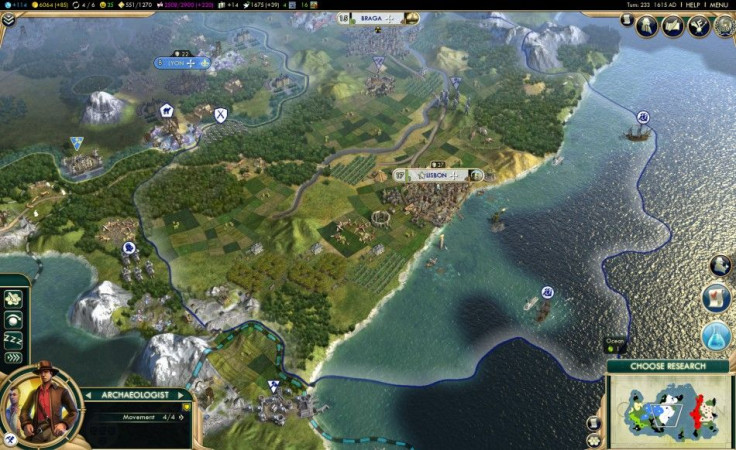
Or you can make like Heinrich Schliemann or the Earl of Elgin and loot priceless Great Works from archaeological sites... from your own territory or from other countries. It's very satisfying to get out there and loot some ancient tombs, and it's a very effective way of ramping up Great Work production later in the game. And it's amazing flavor: the cool factor here is very high.
Civilization V: Brave New World Review: World Congress
Enough about Culture. Diplomacy also got a revamp in Civ V: Brave New World, the key to which is the World Congress system. This is also geared toward the later game; it unlocks when one civ has met every other civ and has discovered Printing Press. After that point, it works like the Apostolic Palace and U.N. from Civ IV, but much more fleshed out. Every certain number of turns, the current host proposes subjects for votes, civs vote, and the results are implemented worldwide.
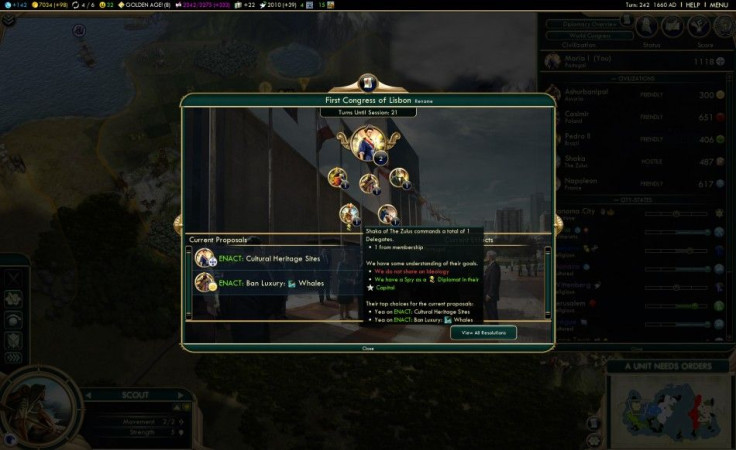
And there are some pretty cool things up for votes: you can ban luxuries, raise military maintenance costs worldwide, establish a world religion, embargo city states or whole civs, and, of course, ban nuclear weapons. The laws are binding, unless repealed later on. The strong variety really helps World Congress, and it's a welcome addition.
It has a few problems, though. The main one is the delegate system, which determines how many votes civs get. This increases over the ages, and eventually each city state gets a vote as well. But the trouble is that each civ ultimately has a similarly weighed vote; I'm more partial to the Civ IV system, where votes were allocated based on population. Now, you have to influence a bunch of city states, or use spies as diplomats, if you're going to try to rubberstamp your way to the top.
Civilization V: Brave New World Review: Ideology
In vanilla, the last three policy trees - Freedom, Autocracy, and Order - were mutually exclusive and each very powerful. They still are, but they are no longer Social Policy trees. They are Ideologies, and contain many more individual Social Policies. After beginning the Industrial Era or building three Factories, a civ must commit to one of the three, each of which provides very, very strong bonuses geared toward particular victory conditions. And the consequences are far reaching in diplomacy as the world divides into ideological blocs. Now that the number of complete policy trees you have is completely irrelevant, the new Ideology system really helps diversify civs in the late game. If you're way ahead, you'll still be way ahead, but when your neighbor adopts Autocracy while you adopt Freedom - well, interesting times ahead.
Civilization V: Brave New World Review: Overall
One of the most impressive things about Civ V: Brave New World is simply how much stuff is in it. Gods and Kings, the previous expansion, didn't feel light: it added a religion system, espionage, a few new wonders, units, and techs, and nine new civs. It was a very good expansion.
Brave New World offers so much more (and it includes the two core mechanics from Gods & Kings, espionage and religion, but not its civs). In addition to everything discussed above, the full Social Policy tree has gotten a revamp, including two new trees, wonders exclusive to each branch, and a very wise design decision to make every policy tree pretty solid in its own right. Religion and Faith have more uses, and you can get an extra belief through the Reformation policy in the Piety tree (they are very powerful). There are eight new wonders. There are two new scenarios - one a war scenario set during the American Civil War, the other a randomized model of the Scramble for Africa. And I'm sure there are some other treats I haven't found yet.
Truth is, Brave New World does exactly what it sets out to do: it makes the second half of the game vastly more interesting and competitive. It unbreaks a lot of vanilla Civ 5's broken mechanics. It makes two victory conditions actually interesting and dynamic. And it adds whole stacks of cool new mechanics, which flow naturally and well.
Civ 5 was always a good game. If you're a longtime Civ fan, you'll be all about Brave New World - it makes Civ V the deepest it has ever been, although it focuses on different areas than Civ IV does.
If you're a Civ V fan but it's your first Civ game, the greater complexity of the new mechanics may throw you for a bit. Mastering Culture Victory feels a bit harder, at least on a first playthrough. It's worth playing down a difficulty level compared to usual until you get into the swing.
Whatever your Civ status, though, I'm pretty sure about one thing. If you like Civilization V, you'll like Civilization V: Brave New World even more.

















